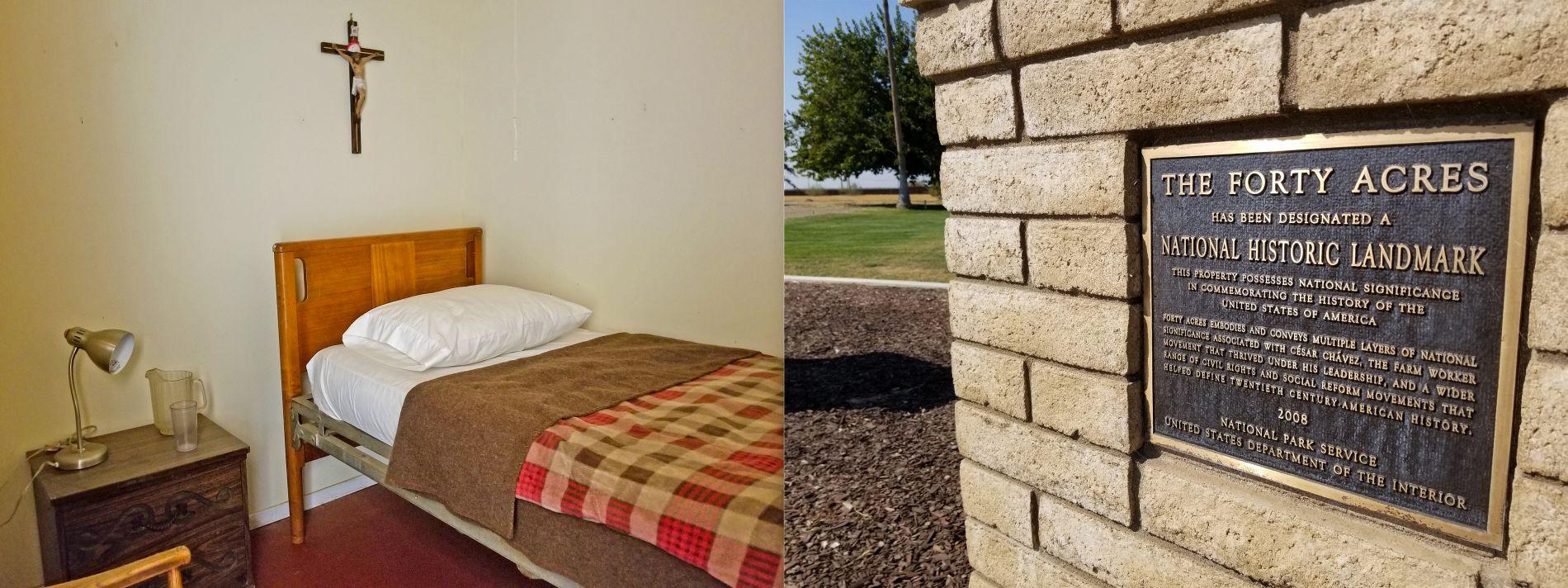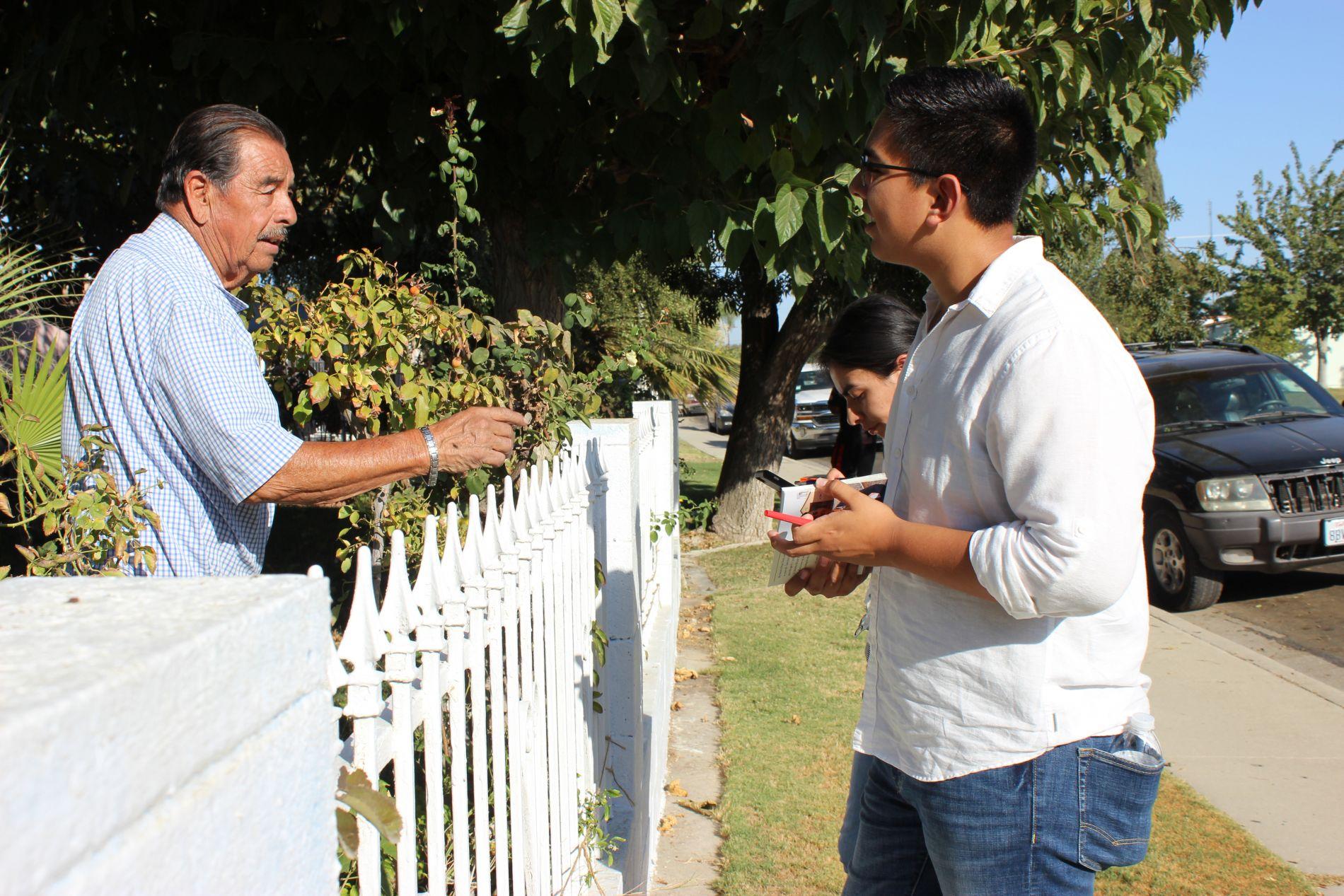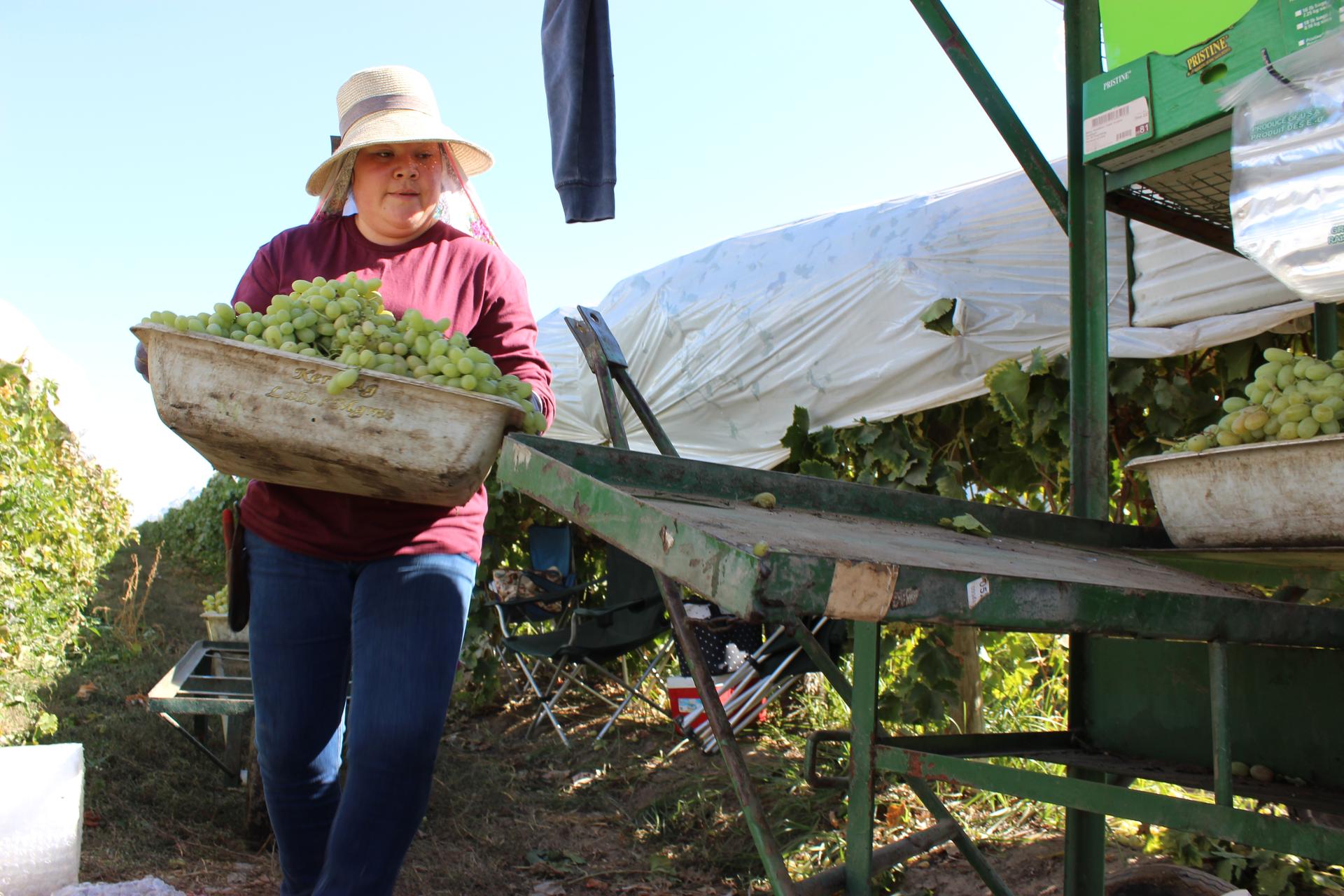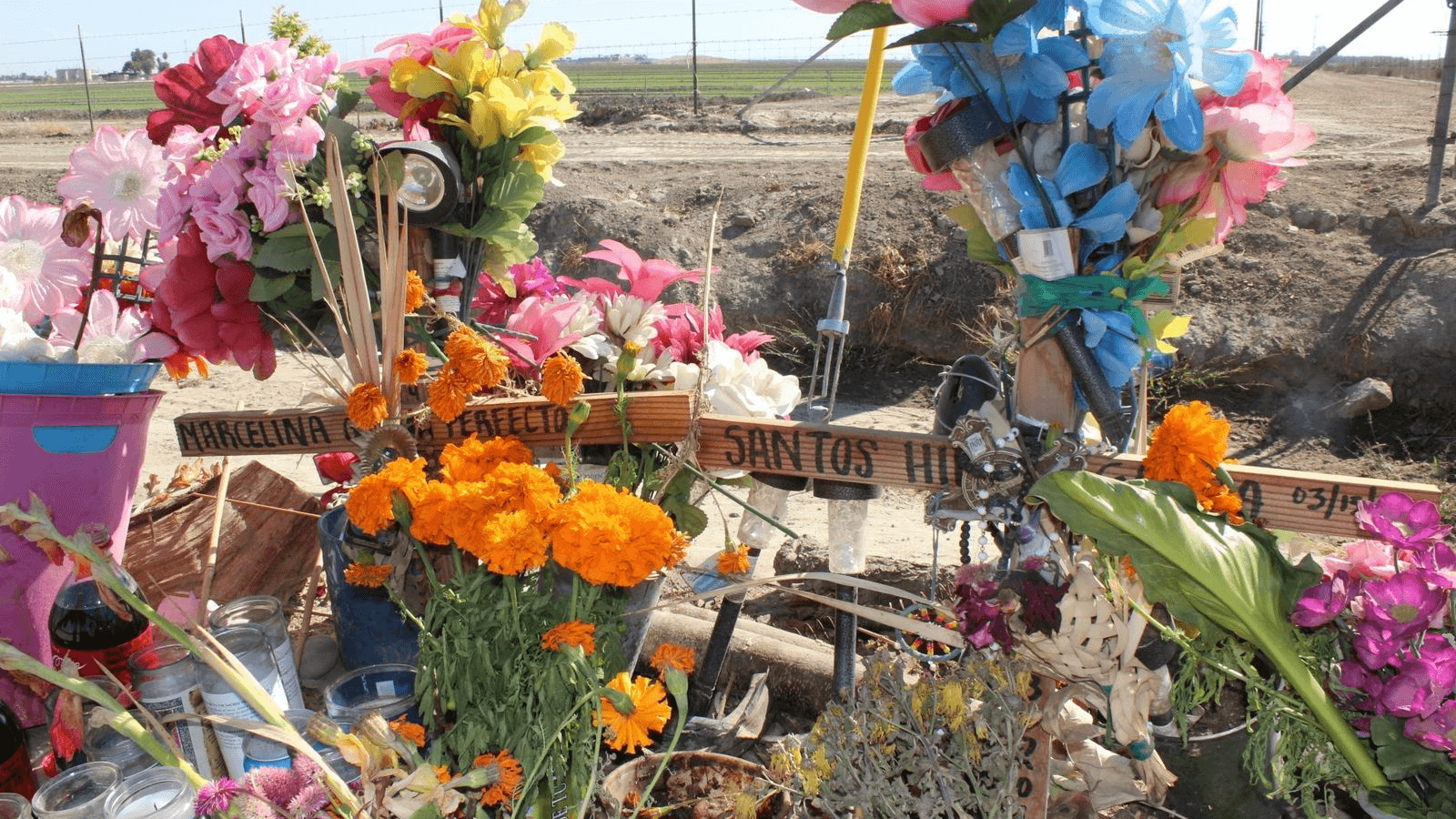The Center for Public Integrity is a nonprofit investigative news organization based in Washington, DC.
Tragic immigrant deaths fuel drive to ‘flip’ California GOP congressional district
A shrine sits next to a Delano road where Marcelina and Santos Garcia died in a car crash while fleeing US Immigration and Customs Enforcement agents.
A small shrine with fresh marigolds and votive candles marks the spot where immigrants Marcelina and Santos Garcia were killed on March 13.
The couple, of Mixtec Indian origin, had emigrated to California’s Central Valley from a rural region in Mexico where family values are strong. Like so many other immigrants, they built a life in Delano, a city of 53,000 that’s about 140 miles north of Los Angeles. There, they worked in the world’s most productive farm industry, in its vast sea of grape vines, fruit trees and multi-seasonal crops. But early that March morning, as the Garcias drove through town, US Immigration and Customs Enforcement agents closed in on their SUV.
Attempting to evade agents, the undocumented couple sped down a country road. The vehicle went out of control and crashed into a pole and rolled over, killing the Garcias, who never knew that ICE was looking for Santos’ brother, not for them.
The Garcias’ deaths left their six children, who are not all US citizens, orphaned. And in Delano — where in 1965 the United Farm Workers first carved their place in history — anger and fear about what happened has added urgency and upped the stakes for the midterm election occurring Tuesday.
“This has been a huge wake-up call for the Latino community,” said Yazmin Hernandez, 22, a graduate of Fresno State University who helps legal permanent-resident immigrants in Delano apply for citizenship. “As a child of farmworkers,” she said, “I really want to vote.”
Related: Georgia at a crossroads: ‘A black woman as governor in a southern state? That speaks powers.’
But do others agree? Hernandez and a lot of young Latinos like her — many motivated, some less so — could be pivotal to what happens in this grape-growing region with a disappointing history of voter turnout. That history explains why get-out-the-vote campaigns hoping to energize thousands of voters have been sweeping through California’s Central Valley in recent weeks, as labor groups and immigrant rights activists aim to send a message to President Donald Trump.
In the eye of the storm: the district’s congressman, US Rep. David Valadao, a Republican who has defied the odds by being elected three times in a district where Democrats hold a registration advantage and Hillary Clinton was victorious just two years ago.
Youth get involved
There’s no escaping Delano’s dramatic past. Not far from the roadside shrine commemorating the Garcias, the United Farm Workers’ original adobe headquarters, “Forty Acres,” is now a national historic landmark — something few would have imagined in the late 1960s here in Kern County. A bronze plaque and other markers explain Delano’s place in a chapter of American history that still rankles some conservatives and divides people here even today.
It took a five-year strike and a national boycott campaign for the UFW to obtain its first union contract in 1970 benefiting Mexican American and Mexican and Filipino immigrant grape laborers. As door-to-door voter turnout campaigns tick up to Election Day, Forty Acres is a reminder that change can take root slowly.

For frustrated Democrats, this is a crucial beachhead. Out of the 53 seats allotted to California in the House of Representatives, only 14 districts are held by Republicans in a state that’s been gradually turning deep blue for years now. Delano, 77 percent Latino, sits in one of the GOP pockets: the sprawling 21st Congressional District. “The Almanac of American Politics” says Valadao has won here against Democratic candidates “who have consistently under-performed initial expectations.”
Stretching more than 150-miles northwest to southeast, the Valley district includes parts of Fresno, Kings, Tulare and Kern counties and a piece of the city of Bakersfield. The district is also home to a smattering of small cities, Naval Air Station Lemoore, a major fighter base, and mile after mile of crops and dairy farms.
Interest in midterm elections is usually tepid compared to presidential races. But it’s the age of Trump, and California is a state where Latinos, mostly Mexican American, are now the single largest demographic.
Against this backdrop, Democrats hope that more door-to-door contact with “low-propensity” voters and “ticket splitters” will channel that anti-Trump sentiment into victories in at least a few GOP-held districts. If that happens, GOP California could shrink more and contribute to “flipping” the Republican-held US House of Representatives to Democrats. But Valadao has not been alone in bucking the tide; neighboring conservative districts are held by House Majority Leader Kevin McCarthy and rising conservative star Devin Nunes.
Related: ‘In love with democracy,’ Ilhan Omar draws diverse supporters in bid for Congress
Democrats would dearly love to do better here. But even enthusiasts don’t expect turnout miracles.
Statewide, Latinos are only 21 percent of those most likely to vote in elections generally, even though 34 percent of those eligible to vote in California are Latino, according to the Public Policy Institute of California.
But young people, especially, who are scared for their peers’ or their own undocumented parents, say there’s no choice but to hit the streets and persuade those eligible to cast ballots.
“We share a history as the children of immigrant parents. We don’t know if the next ICE pursuit with be for one of our families,” said Bryan Osorio, 22, who grew up in Delano. He explained the personal stakes for so many here during a meeting at Delano’s sole Starbucks. The coffee shop wasn’t far from where workers, swaddled in scarfs to fend off dust, were gleaning the last of this area’s gargantuan crop of table grapes to ship back east.
After the Garcias died, Delano police examined video and found that ICE agents had pursued the couple with lights flashing, contrary to what ICE agents told officers investigating circumstances of the chase. Police recommended Kern County prosecutors charge ICE agents for providing false information, but prosecutors disagreed that evidence supported that charge. Osorio and fellow students who were home on spring break marched with Delano high school students denouncing Trump’s aggressive deployment of ICE.
Osorio’s immigrant parents aren’t citizens and can’t vote, he said. But he can.

Going back years, Republican politicians and agribusiness companies in California have acknowledged that they depend on immigrant workers, many of whom likely don’t have authentic work documents. As producers of more than half the fruits, vegetables and nuts in the country — and as the biggest dairy producers — California agribusiness interests lobbied Washington for years to legalize the labor force.
That didn’t happen, and then Trump was elected.
Because he’d like a leadership role in vigorously challenging Trump policies, Osorio is now running for Delano City Council. He’s also vowing to address Delano’s poor water quality and to stop water rate hikes burdening low-income families here. Armed with research to help him home in on infrequent voters, the recent University of California at Berkeley graduate has been knocking on doors on the west side of Delano, which was the Latino barrio back when Latinos were a minority and some white-owned establishments barred Mexicans from entry.
Related: Immigrants have a long history of taking their issues to the people — as political candidates
Other college students are backing Osorio, and they split up homes chosen as targets. When he’s not campaigning, Osorio’s working as a fellow at the American Civil Liberties Institute.
“I’ve gotten a lot of vulgar comments from older men,” Osorio said of reactions to his campaign. “They said, ‘When I was your age I was chasing girls and partying. But my respect to you.’”
During his canvassing rounds, Osorio secured a verbal pledge of support from an 80-year-old citizen relaxing in his rose garden. A younger man in dusty work clothes shook Osorio’s hand and assured him in a mix of Spanish and English that he’d already voted “all Democrats” and for Osorio.
“Maybe he did,” Osorio said, as his team discussed follow up visits. Not all voters appreciated the students’ visits. As one of Osorio’s friends approached a house, he was met with: “I don’t vote. Go away.”
Split-ticket voters
It’s easy to see why it’s frustrating to Delano immigrant activists and Democrats that the 21st Congressional District remains Republican.
The sun–baked valley has some of the worst air pollution in the country and high rates of health problems like diabetes and asthma. Obamacare was a boon to many low-income residents here.
The district chose Democrat Hillary Clinton over Trump by about 16 points in 2016, making it one of seven GOP-held congressional districts in the state where the Democrat prevailed. But even with an estimated 16-point Democratic registration advantage over Republicans in the 21st District, voters also returned Valadao to Congress.
Like the more nationally recognizable Nunes, Valadao, 41, comes from dairy-farming roots. A bank seized Valadao’s family farm in June due to $8 million in unpaid loans, a crisis Valadao said exemplifies the travails of farmers he serves.
A mild-mannered man, Valadao recently posed in Arizona with President Trump, along with Nunes and McCarthy of Bakersfield, who hopes to vault from GOP majority leader to speaker of the House if the GOP retains control.
The photo op on Oct. 19 was all about irrigation water — a massive issue here. It showcased Trump signing a memo accelerating biological reviews of water systems that Central Valley farmers — and workers — hope will divert more water from California rivers that are home to endangered species. Trump’s move was met here with strong approval, and Valadao was by his side.
In addition to its tight bond with agribusiness, the Valley is also one of California’s most culturally conservative regions. Evangelical churches are prominent, along with conservative talk radio. Some local Latino activists suggest, too, that Valadao has benefited at the polls because some voters think he is of Mexican heritage. In reality, Valadao is of Portuguese descent, as is Nunes.
So, what gives Democrats hope for this election?
The president’s lacerating rhetoric about Mexican immigrants has upset a lot of people, so even if they regard Valadao as moderate, Trump has further tarnished the Republican brand in California. About 62 percent of the 21st District’s residents who are eligible to vote are Latino.

“These immigrants risk their lives to work here,” said Mexican American Erica Cruz, 48, a self-employed hairdresser whose husband used to be undocumented. “Latinos are getting picked on. This town thrives on Latinos. … Trump is putting us in a terrible position, and we’re scared.”
It’s irksome to Cruz because it’s plain to her that the region’s agribusiness industry — America’s farm powerhouse — has benefited from people who shoulder all the risks that come with undocumented immigration. Workers have assumed the burden of paying smugglers thousands of dollars to get them over the border, so they can take back-breaking jobs they obtain by showing fake documents that employers have no obligation to authenticate.
Today, it’s common for there to be no bright line between documented and undocumented in towns like Delano because there are many “mixed status” families, with some members citizens, others legal residents and still others who are undocumented, sin papeles, without papers.
Valadao, whose campaign did not respond to interview requests, has succeeded in part because he’s sensitive to the composition of his district, and he’s tried to walk a difficult line on immigration.
On his Spanish-language website, he calls himself an “hijo de inmigrantes,” a son of immigrants.
Valadao’s website also says he supports a path to legal status for undocumented people: “This will allow mills of immigrants to come out of the shadows … and raise their families without the constant fear of deportation.” But none of Valadao’s positions have gone anywhere under GOP leadership.
When pressed on immigration, Valadao has pointed out that he signed a petition this year designed to force GOP House leaders to allow lawmakers to vote on a series of complex immigration proposals, among them a path to legal status for Dreamers, undocumented people brought to the United States as children.
The petition failed to lead to any reforms passing.
In Delano, voters seemed either unaware of the byzantine petition process or dismissed it as window dressing to aid GOP legislators looking for Latino votes.
TJ Cox, Valadao’s Democratic rival, told Valadao during a recent debate: “The fact is your party has control of every branch of government … and you can’t pass … an immigration bill.”
Cox, 55, is a Fresno engineer and businessman who’s developed dams — he can talk water — and who’s also founded two nut-processing businesses and a series of health centers in lower-income areas. He’s part Chinese and Filipino, which he’s highlighted in this multicultural region.
But Valadao has attacked Cox for living a few miles outside the 21st District — which is allowed — and for what Cox says was an “honest mistake” in claiming his Fresno home and an East Coast home as his primary address while his wife was studying in Maryland.
The influential Cook Political Report predicts a win for Valadao. It’s moved the 21st District race to “likely Republican,” rather than the more equivocal “lean” or “toss up” designations given to some of California’s other contested districts.
Cox’s campaign, though, sees hope in fresh numbers pollsters might not be capturing.
Since Trump took office in January 2017, campaign workers point out, more than 30,000 additional people have registered to vote in the 21st District, more than 20,000 of them Latinos.
“Latinos know there’s some guy there in the administration that has no respect for them,” Cox told the Center for Public Integrity after his wife, Kathleen Murphy, a pediatric intensive care physician, passed her cell phone over for a chat. On a recent weekend, she was in a Delano park with supporters who fanned out through town as part of a Democratic “blue wave” door-to-door strategy to try to coax voters to come out.
Joining Murphy was Cruz, the Delano hairdresser, who said that rather than just casting a ballot this year, she felt compelled to hold home meetings and to canvass along with other bilingual volunteers. She’s hoping Republican hostility to the Affordable Care Act — and Valadao’s votes to oppose and then repeal it — will also animate voters to choose Cox.
But, she conceded, many people aren’t aware of Valadao’s votes and she’s left explaining them.
“We must fight back,” she said.
Veronica Lopez, 36, a medical technician, is just the type of voter Cruz wants to reach.
In an interview at Starbucks, where she was scrolling through her phone, Lopez said that she had voted for Hillary Clinton. She has health insurance through her job. What’s weighing on her mind these days is college affordability, which has stymied her son’s plans for a four-year college.
She does care about immigration to the extent that she doesn’t want to see families “torn apart.”
“I don’t like people deported for no good reason,” she said. Farms have been losing workers because of ICE enforcement and they need workers, she added.
And as for Trump, she said with a shake of her head, “I’ve never seen a president who talks so badly about people.” Will she vote? She thinks so but wasn’t certain. She didn’t seem that excited about the kinds of races on the ballot this time around.
Political scientist Mark Martinez at California State University at Bakersfield, also in Kern County, said he thinks if TJ Cox were running in a presidential election year, his odds of defeating Valadao would be far greater.
A longtime observer of elections here, Martinez said it’s “Poli Sci 101” why more Central Valley voters don’t come out more at midterms: Just as in other parts of the country, he said, the least advantaged people are the least likely to believe their vote matters.
“We have some of the poorest congressional districts,” he said. Valadao, he added, doesn’t make “any stupid mistakes” with regard to the hot-button issue of immigration.
Sowing voter seeds
Another Delano resident, Valerie Gorospe, 40, is a community organizer at Delano’s Center on Race, Poverty and the Environment. She collaborated with a bipartisan voter-registration education campaign this past year called Central Valley Freedom Summer.
The campaign sent college students from the University of California’s Santa Cruz and Merced campuses back to their Valley hometowns to talk to kids about voting, and register 18-year-olds along with kids 16 and older, who can pre-register in California.
Gorospe grew up in an Earlimart, right across from a giant vineyard in the 21st Congressional District.
Gorospe said she can’t understand how agribusiness can continue to vote for politicians who support Trump, who’s portrayed undocumented people as criminals and has pushed for blanket deportation.
“It’s like cutting your arms off,” Gorospe said of Trump-supporting politicians whose districts have so eagerly used immigrant laborers.
The Kern County Farm Bureau didn’t respond to a request to talk about Trump, ICE enforcement and the election. The group’s Facebook page has multiple posts about labor shortage concerns and educational sessions on how to respond to audits of employment records ICE carries out to identify potential undocumented employees.
Local chambers of commerce and the US Chamber of Commerce have endorsed Valadao, because of his connections to “ag, energy and water,” as a press release said.
Gorospe said she thinks Trump and GOP positions on immigration are going to bring more younger voters to the polls next week.
“I’ve never seen curiosity about voting in this age group like I’ve seen this year,” she said. “They’ve really connected federal policies with what’s happening here.”
Others are trying to share that optimism. Veronica Terriquez, who is a UC Santa Cruz associate professor of sociology, organized the Freedom Summer project. Research, she said, shows that kids are often “socialized” to vote and learn about candidates and issues within their family. The project is trying to address the absence of that socialization in Central Valley homes because so many kids’ parents aren’t citizens and either can’t vote or vote infrequently.
Schools, too, Terriquez said, don’t devote a lot of time encouraging voting. She said some Central Valley school administrators, worried about controversy, were initially hesitant to allow returning college students to talk with younger kids and conduct registration.
“One of the high school students asked if there were concerns if she, a citizen, registered, and her parents were undocumented,” Terriquez added.
During the 2014 midterms, turnout among all Californians eligible to vote was a record low of about 31 percent. But for eligible 18- to 24-year-olds, turnout was even worse at about 8 percent. Turnout for the young demographic in the Central Valley was even lower at less than 7 percent, according to research by the California Civic Engagement Project at the University of Southern California’s Sacramento office.
Mindy Romero, director of the California Civic Engagement Project, said that beyond registration, cultivating turnout “takes deep, multiple contacts,” along with strategies that include “peer to peer” outreach and time spent in communities off the election cycle.
That’s what one nonpartisan group, Faith in the Valley, has been trying to do in five counties, including Kern, where Delano is.
“We’re shooting to speak to between 12,000 and 15,000 voters,” said Carmen Medrano, a regional organizer for the Valley group. “We’re not from a political party, we say. We’re here about issues, like affordable housing, fair rents, making sure immigrant families are protected.”
The United Farm Workers are also active in the district, though they’re focused more on a state Assembly race. On their rounds, canvassers explain the union’s slate choices, which include Valadao’s opponent, TJ Cox. UFW member Nancy Oropeza, who’s working on the effort, said that canvassers have also left potted flowers with voters to remind them — when you water the flower, think about voting.
The UFW assignment was to reach a universe in multiple towns of 16,000, face-to-face, who are Latino and infrequent voters.
“The first thing we’ve been hearing from people we contact is: Trump, Trump. He attacks us,” Oropeza said. “Once they say, yes, they want to vote, you go back to ensure they’ve received their ballot.”
Over at Delano’s Our Lady of Guadalupe Church, another influential institution in town — which has collaborated with the UFW to aid the orphaned Garcia children — Father Miguel Campos said the church doesn’t favor candidates in elections. But the church does believe that elections matter.
“We tell people,” he said, “that it’s a civic and Christian duty to vote.” This coming Tuesday, he’ll find out whether they’re listening.
